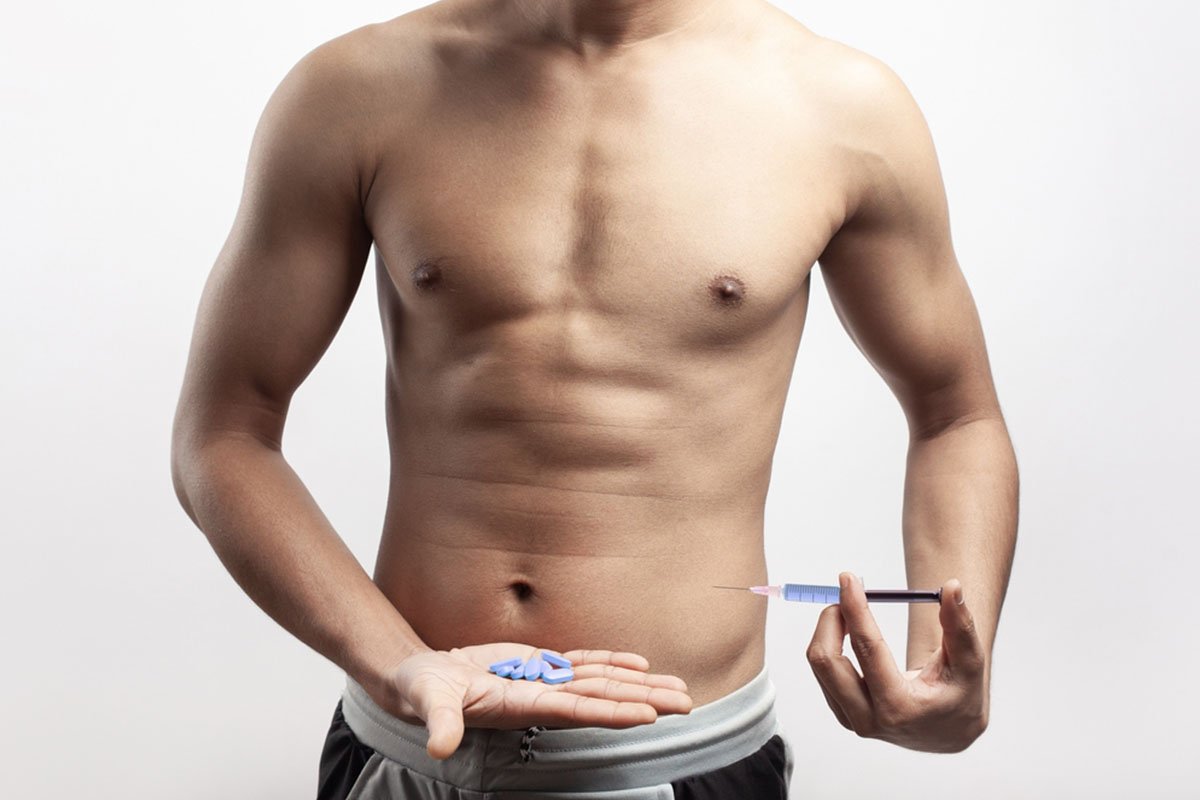
Uncomfortable with male breast tissue growth? You might be experiencing gynecomastia, a condition linked to alterations in hormonal balance. The main focus of this article is to critically examine the connection between steroid use and gynecomastia. Herein, we also delve into the symptoms, potential causes, possible preventive approaches, and various treatment options, including surgical interventions and lifestyle adjustments. Keep reading if you’ve been using steroids and have noticed unusual breast enlargement lately.
The Role of Anabolic Steroids in Gynecomastia
Anabolic steroids, commonly used in bodybuilding and to improve athletic performance, have been tied to the development of breast tissue. These steroids aid in muscle growth and increase muscle mass. As a consequence, they disrupt the body’s natural hormonal balance, often leading to the development of glandular breast tissue.
In many cases, professional bodybuilders who frequently use anabolic steroids experience severe gynecomastia. This results from the body’s attempt to counterbalance the excess testosterone by increasing female hormone production, leading to the development of breast tissue in males, commonly known as gynecomastia.
Steroids’ potential side effects are often overlooked due to the pressure to maintain a certain standard of physical performance. The gynecomastia issue emphasizes the need for safer alternatives to anabolic steroids, thereby eliminating the concern of such negative side effects.
While muscle growth and increased muscle mass are attractive benefits of steroid use, the development of unwanted breast tissue indicates the risks involved. This understanding underscores the importance of monitored use and alternative approaches to achieving desired physical results.
Anabolic steroids play a significant role in the onset of gynecomastia, making their use a point of contention in professional bodybuilding. By understanding this correlation, athletes can make informed decisions about their bodybuilding and fitness strategies.
Steroids’ Effect on Body’s Hormonal Balance
Anabolic steroids can cause a significant hormonal imbalance in the body. This imbalance is primarily characterized by an increase in the level of estrogen. The frequent intake of steroids can lead to the body producing excessive amounts of estrogen, leading to several health problems including gynecomastia. Therefore, it’s important to understand the long-lasting implications steroids can have on the body’s hormonal balance.


SPECIALIST CARE YOU CAN TRUST
Dr. Salloum is supported by a brilliant team of caring staff members.
You can trust the entire staff to help make your visit as comfortable and safe as possible!
The Link Between Estrogen Levels and Gynecomastia
Estrogen plays a significant role in breast development, a condition characterized by enlarged breast tissue in males. A surge in estrogen levels, a hormone typically associated with female sexual development, often leads to this condition. Contrarily, when estrogen levels are balanced with testosterone, gynecomastia is less likely to occur.
A hormonal imbalance favoring estrogen over testosterone can expedite the process of fat storage and breast tissue growth. The imbalance may be a result of various factors including obesity, substance abuse, or the intake of drugs inducing estrogen production. This demonstrates the compelling link between high estrogen levels and the development of gynecomastia.
Understanding this connection is vital as it influences prevention strategies, and helps to paint a larger picture of this condition’s etiology. Hormone management, primarily aimed at maintaining balanced estrogen levels, becomes a key aspect of the treatment of gynecomastia.
The Role of the Aromatase Inhibitor
The aromatase inhibitor has a significant role in regulating estrogen levels within the body. It tackles gynecomastia by countering the overproduction of estrogen hormones which is a root cause of this condition. These inhibitors block the conversion of testosterone to estrogen, leading to a decrease instead of an increase in estrogen levels. Through this method, the aromatase inhibitor helps balance the body’s hormonal levels to alleviate the symptoms of gynecomastia.
Surgical and Non-Surgical Gynecomastia Treatment Options
Surgical options for treating gynecomastia revolve around removing glandular and fatty tissue from the chest area. This gynecomastia surgery, often performed by plastic surgeons, is known as breast reduction. Surgeons typically conduct a consultation with patients to discuss the nature of the surgery and evaluate the extent of the gynecomastia.
Another surgical method involves liposuction, where only the fatty tissue is removed. This is often used in mild cases of gynecomastia where the primary issue is excess fat rather than glandular tissue enlargement. This approach helps in maintaining a proportionate muscle mass in the chest region after surgery.
Non-surgical treatments for gynecomastia largely involve changes in lifestyle. These include a balanced diet and regular, guided exercise as these methods can help decrease fat levels in the body, including unwanted breast tissue in the chest area. However, these methods could take longer to show visible results compared to surgery.
In circumstances where gynecomastia is due to the misuse of anabolic steroids, professional guidance is recommended for a safer steroid cycle or substituting them with safer alternatives. Monitoring and limiting steroid use is critical in avoiding the recurrence of gynecomastia post-treatment.
Hormonal treatments involving prescription drugs are also an avenue of non-surgical treatment of gynecomastia but should be pursued under medical supervision. Such treatments focus on correcting the imbalance between estrogen and testosterone levels, the main cause of gynecomastia.
Changes in Diet and Exercise
Weight gain can exacerbate gynecomastia by increasing excess breast tissue. Incorporating a well-balanced diet and regular physical exercise, including bodybuilding, can promote weight loss and muscle growth. Supplements can further aid in muscle development and balance hormonal levels, potentially alleviating symptoms of gynecomastia. Remember, though, that these lifestyle changes should accompany medical or surgical interventions for optimal results.
Steroids and Non-Glandular Gynecomastia
Steroids are supplements often used for body enhancement, but they can contribute to non-glandular gynecomastia. Unlike regular gynecomastia, non-glandular gynecomastia isn’t related to chest gland enlargement. Instead, this condition results from increased fatty tissue surrounding the breast area. Athletes and bodybuilders who use steroids might experience this breast growth due to hormonal imbalances caused by these substances. Certain precautions are advisable to prevent or manage this adverse effect. It is essential to remember that everyone’s body responses vary, making personal experience a critical factor when evaluating the potential impacts of steroid use.
Impact of Gynecomastia on Personal Experience and Psychological Health
The impact of gynecomastia on personal experience and psychological health can be significant. The condition tends to affect one’s self-image heavily, often causing distress about the appearance of the chest. This can particularly be an issue in situations requiring body exposure, such as at the beach or gym. Oftentimes, this distress is directly linked to feelings of shame or embarrassment related to the development of breast tissue.
Interestingly, some tie their gynecomastia to prior use of steroids. This personal experience tends to lead to regret and self-blame. In some, the anxiety attached to the appearance of their chest even prompts consultation for surgical options. Ultimately, this indicates that gynecomastia can have a profound psychological impact.
For personalized advice and expert gynecomastia treatment, booking a consultation with board-certified plastic surgeon, Dr. Gabriel Salloum, is the step to take. With vast knowledge about hormonal imbalances, the role of anabolic steroids, and a deep understanding of the gynecomastia condition, Dr. Salloum can provide you with the best surgical or non-surgical treatment options based on your individual needs. Trust an expert – seek the best advice for your personal health.